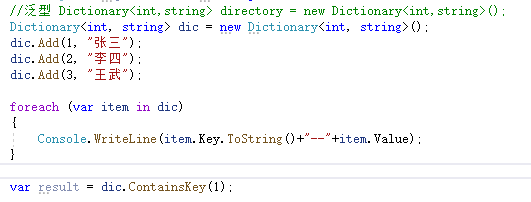泛型基础知识
1.什么是泛型?
泛型(Generic) 允许您延迟编写类或方法中的编程元素的数据类型的规范,直到实际在程序中使用它的时候
......
2.泛型类,泛型方法,泛型接口,泛型委托
(1)List泛型
Object类型是不安全的

(2)Dictionary

(3)自定义泛型
public class MyGenneric<T> { private T t; public MyGenneric(T t) { this.t = t; } public void Show() { Console.WriteLine(t); } } //-------------------------自定义泛型----------------- MyGenneric<string> myGeneric = new MyGenneric<string>("这是自定义泛型"); myGeneric.Show();
(4)泛型方法
public void ShowList<Tm>(Tm tm) { Console.WriteLine(tm.ToString()); } myGeneric.ShowList<string>("这是泛型方法"); myGeneric.ShowList<int>(88888);
3.泛型的好处和原理
好处:最大的优点就是通用性,写一个方法和类以后,在很多地方可以使用

exe/dll(主要区别:exe有文件入口) --- metadata(元数据:描述exe/dll文件的一个数据清单)----反射(Reflection)用来操作获取元数据
注:clr/jit也需要读取到metadata,那么就需要用到反射
泛型在编译时是通过<>来占一个位置,然后 在CLR/JIT(运行时)确定具体类型
5.泛型约束
(1)new()约束 --表示T类型只能接收带一个无参数的构造函数
class Student //普通类 { //默认有一个无参数的构造 } public static void Main(string[] args) { Student student = new Student(); Show(student); } public static void Show<T>(T t) where T : new() { Console.WriteLine(t); }
(2) struct 值类型约束
public static void Show<T>(T,t) where T:struct { }
(3)class 引用类型约束
public static void Show<T>(T,t) where T:class,new() //可以多种约束 { }
(4)自定义类型约束(基类型约束,接口类型约束)
public static void Person<S,K,D>(S s)
where S:Student, IStudent,IStudent<K> //基类约束只能有一个
where K:struct
where D:class,new()
{
}
6.协变 逆变 (了解)
People people = new People(); People people1 = new Teacher();//people 父类 Teacher子类 继承父类 Teacher teacher = new Teacher(); List<People> peopleList = new List<People>(); //[1]//从现实生活中,应该是正确的CIA对,但是两者不是同一个类型 //两者不是一个类型,报错,语法规则 .net2.0和3.0才有协变逆变 //List<People> peopleList1 = new List<Teacher>(); //[2]协变和逆变是针对泛型接口和泛型委托来说的,离开了他们就没有这个说法 //[3]out关键字代表是协变,in代表是逆变 //什么情况下使用:需要解决 泛型类型 子类 实例化父类时,或者父类实例化子类 IListOut<People> listOut = new ListOut<People>(); IListOut<People> listOut1 = new ListOut<Teacher>();//协变 T 只能作为返回类型 IListIn<Teacher> k = new ListOut<Teacher>(); IListIn<Teacher> kk = new ListOut<People>(); //逆变 只能作为参数类型
interface IListOut<out T> { T GetT(); } interface IListIn<in T> { void Show(T t); } class ListOut<T> : IListOut<T>,IListIn<T> { public T GetT() { return default(T);//default 关键字,若是值,类型默认返回0,若引用类型,则默认返回null } public void Show(T t) { Console.WriteLine(t); } }
总结: 泛型的用处:让泛型类,泛型方法,泛型接口,泛型委托更--通用
7.泛型缓存